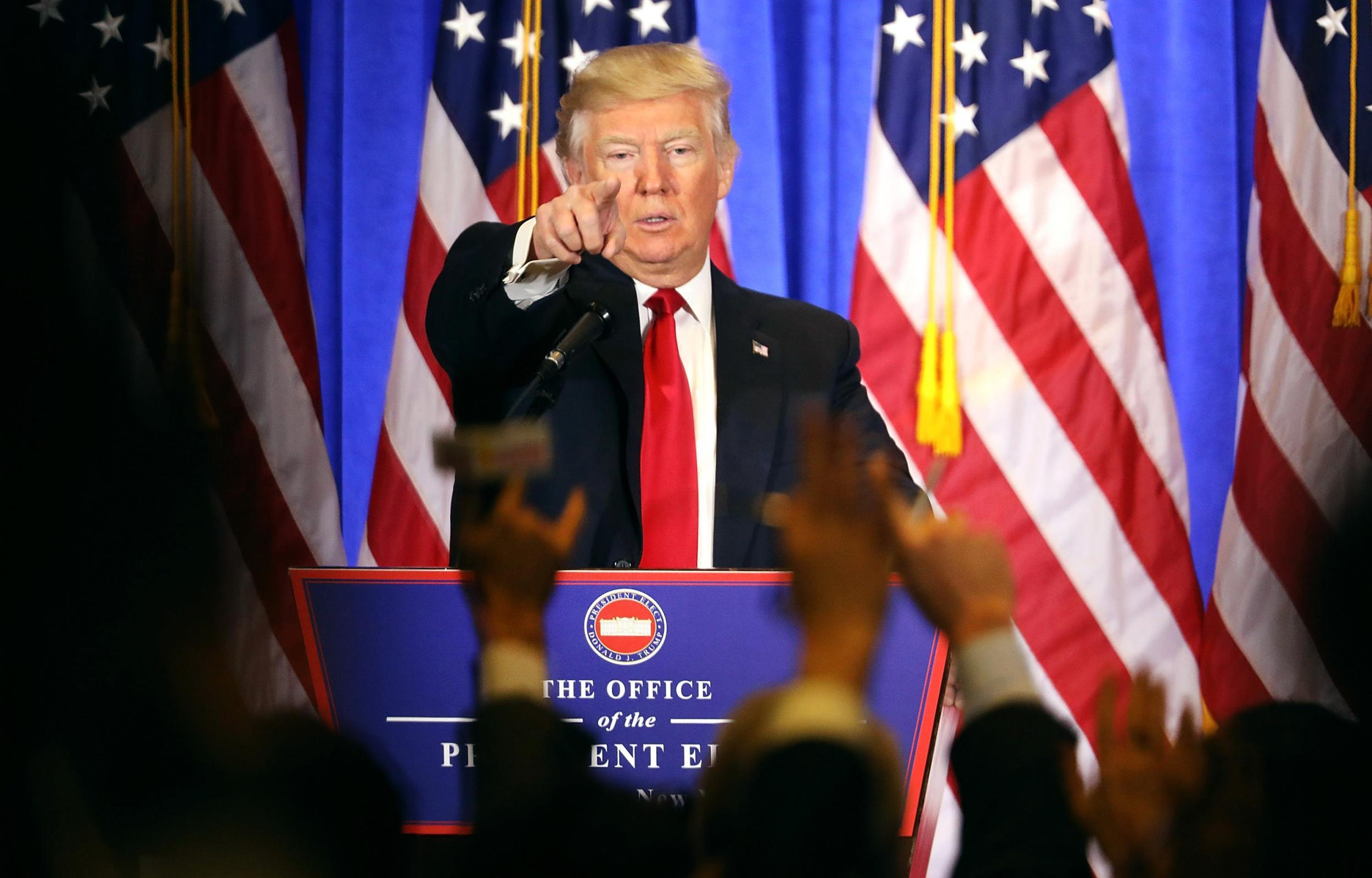Politicians and campaign groups demand Donald Trump fully divests from business empire
'Trump claims he’ll only learn about his businesses from the newspapers, but it’s hard to believe that family dinner conversations will be restricted to the weather'

Your support helps us to tell the story
From reproductive rights to climate change to Big Tech, The Independent is on the ground when the story is developing. Whether it's investigating the financials of Elon Musk's pro-Trump PAC or producing our latest documentary, 'The A Word', which shines a light on the American women fighting for reproductive rights, we know how important it is to parse out the facts from the messaging.
At such a critical moment in US history, we need reporters on the ground. Your donation allows us to keep sending journalists to speak to both sides of the story.
The Independent is trusted by Americans across the entire political spectrum. And unlike many other quality news outlets, we choose not to lock Americans out of our reporting and analysis with paywalls. We believe quality journalism should be available to everyone, paid for by those who can afford it.
Your support makes all the difference.Donald Trump will not divest from his business empire, he will not place his business assets in a blind trust and that trust will not be run by an independent third party.
The broken promises, made during the campaign trail by the billionaire businessman, have severely disappointed his critics. They might have thought that his announcement, which had been delayed by almost a month, would be a flicker of hope that he was ready to separate his political office from his commercial empire.
Rick Perry, Mr Trump’s energy secretary, and his pick for Treasury secretary, Steve Mnuchin, are divesting from their holdings. Yet the man who appointed them is refusing to do the same.
His actions go against past presidents, including Ronald Reagan, who Mr Trump often compares himself to, and who all put their assets in a blind trust.
The Republican’s lawyer, Sheri Dillon of Morgan Lewis & Bockius, suggested that his two sons would run the trusts to the "highest ethical standards", refuse to carry out foreign deals - although still accept foreign leaders to Trump hotels and donate profits to the government - and seek written approval from an ethics adviser before carrying out any new deals. The law firm received an award for its work in Russia last year.
The ethics adviser would surely not be Norm Eisen, former counsel to president Barack Obama, or Richard Painter, former counsel to president George W Bush, who both indirectly urged Mr Trump to liquidate his businesses.
What the experts feared - that the President-elect would maintain a stake in his business, even if he has physically removed himself from the daily wheeling and dealing - has come to pass. His trust will still receive royalties from pre-existing licenses, and he will return to his empire after he leaves the White House.
Democrat representative Elijah Cummings, the top ranking Democrat on the House Oversight and Government Reform Committee, was one of the first to issue a scathing response to Mr Trump’s business plans.
"President-elect Trump has chosen not to divest his ownership interests, not to liquidate all of his business assets, and not to place the process in a truly blind trust run by an independent entity, which is the opposite of what was recommended by Republican and Democratic ethics experts," Mr Cummings said in a statement.
"As a result, it is now up to Congess to fulfil our constitutional duty to act as an independent check on the Executive Branch to ensure that the President is not violating the Constitution. Congress must do this by obtaining all corporate and legal documents relating to the President-elect’s global entanglements and business dealings, including the tax returns he promised to produce to the American people."
Mr Trump insisted his actions were voluntary as there was “no conflict of interest clause” that was applicable to the President. He insisted that he could do deals with Russia, but he would not, and said he turned down a $2 billion deal with Saudi Arabia.
“I don’t want to take advantage,” he said on Wednesday at his first press conference in six months.
Numerous campaign groups agreed with the sentiment that the President-elect had not gone far enough, however.
Danielle Brian, executive director for the Project On Government Oversight, criticised Mr Trump’s promise to not even discuss business with his children.
"Trump claims he’ll only learn about his businesses from the newspapers, but it’s hard to believe that family dinner conversations will be restricted to the weather," she said.
David Donnelly, president and CEO of political campaign group Every Voice, added that Mr Trump’s announcement "falls way short" of preventing a conflict of interest.
"As long as he has an ownership stake in these businesses and his children are involved, there’ll be a cloud of corruption over his entire administration and every decision that could impact his personal profits will be called into question," he said, adding that the only people who will be "blind" are members of the public.
John Wonderlich, executive director of transparency campaign group Sunlight Foundation, agreed that Mr Trump’s conflicts of interest would be “unprecedented”.
"Trump’s plan leaves the Presidency vulnerable to self-dealing, constitutional crisis, the appearance of corruption, and other abuses of power," he said. "Trump’s approach to governance and ethics repudiates decades of accepted norms for modern democratic accountability."
All three groups called for the business mogul to release his tax returns, which Mr Trump has claimed are still under audit.
"I don't think they [American people] care," he told reporters. "I won."
Join our commenting forum
Join thought-provoking conversations, follow other Independent readers and see their replies
Comments